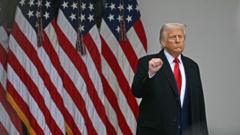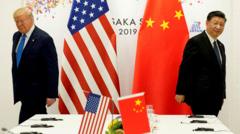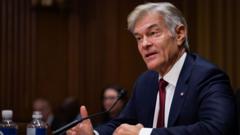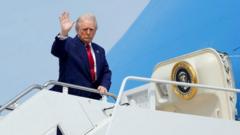The unveiling of new tariffs has sent the stock market into a tailspin, revealing cracks in Trump's political and economic strategy. With foreign policy setbacks and legal challenges to his immigration policies, the president faces growing dissent even within his own party.
Unraveling the Trump Tariff Strategy Amid Political Turbulence

Unraveling the Trump Tariff Strategy Amid Political Turbulence
As Donald Trump rolls out aggressive tariffs, challenges emerge that threaten to undermine his second-term agenda.
Donald Trump proclaimed 2 April as America’s “liberation day” while unveiling sweeping tariffs on US imports. Just two days later, the stock market experienced significant turmoil, signaling that the president’s ambitious second-term agenda is colliding with stark economic realities.
The announcement has drawn swift backlash from international trading partners, including Canada, the EU, and China, indicating a potential trade war. As the market reels, the White House's atmosphere shifted to a defensive posture, with fewer administration officials available for inquiries and preparations underway for anticipated protests outside the secured presidential grounds.
Even with stock market plummeting, President Trump maintains a sense of optimism regarding his economic vision, asserting that America will eventually thrive under his protectionist policies aimed at revitalizing domestic manufacturing. However, the recent developments present a stark challenge to his agenda.
Foreign policy issues are troubling, too. Trump's attempts to broker peace in Gaza and Ukraine are faltering, with Israel intensifying military actions in Gaza and Russia adding conditions to ceasefire discussions, implying a strategy of prolonged negotiation that could yield further concessions from the U.S.
Meanwhile, Trump's immigration policies face mounting legal hurdles. Pending judgments threaten his deportation efforts and immigration reforms, leaving many of his initiatives, including the suspension of asylum processes, stalled in court.
Adding to his woes, recent elections in key districts displayed a worrying trend for Trump and the GOP. Republican candidates in Florida won, but by significantly reduced margins compared to Trump's previous victories. In Wisconsin, a Democratic-backed candidate emerged victorious, suggesting that the Democratic Party may be gaining traction heading into future elections.
As dissent brews within Republican ranks, highlighted by criticism from influential figures like Ted Cruz regarding the potential fallout from the tariffs, the party's allegiance to Trump could be tested if prolonged economic distress occurs. The complex interplay of tariffs, legal disputes, and electoral momentum could catalyze a significant shift in the political landscape as Trump's administration navigates this challenging phase.
While Trump might feel liberated from immediate electoral pressure, the underlying economic and political forces will inevitably challenge his strategies.






















